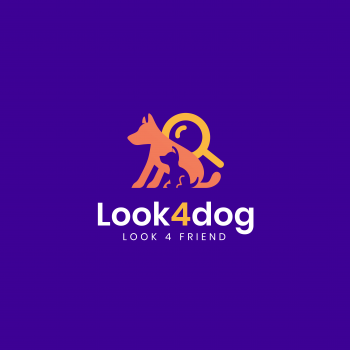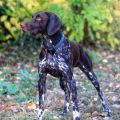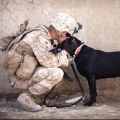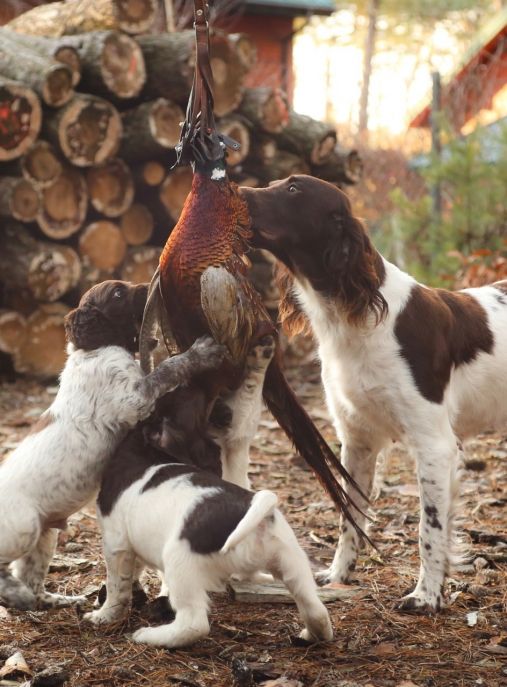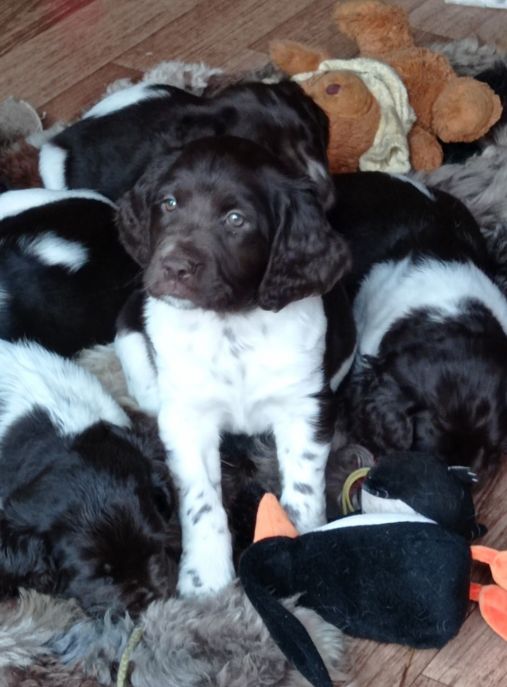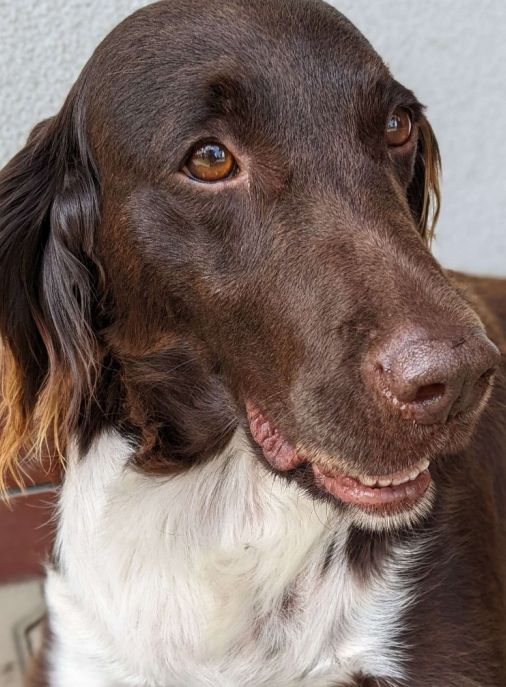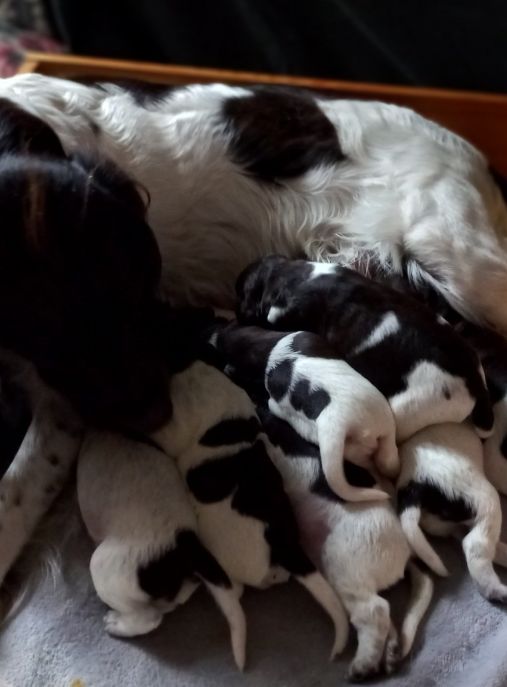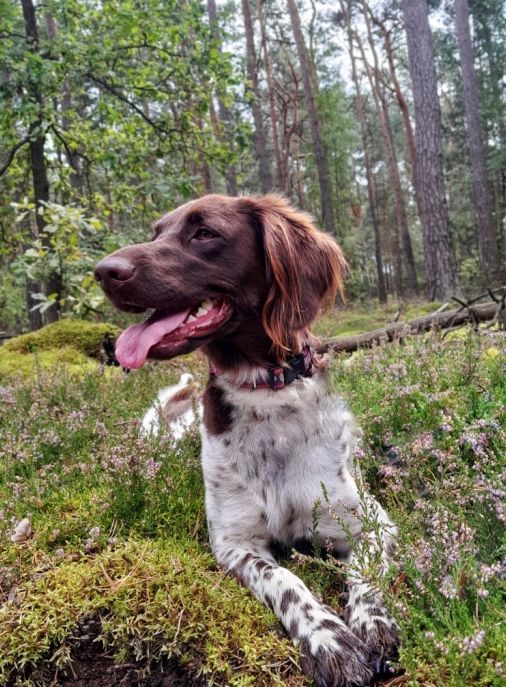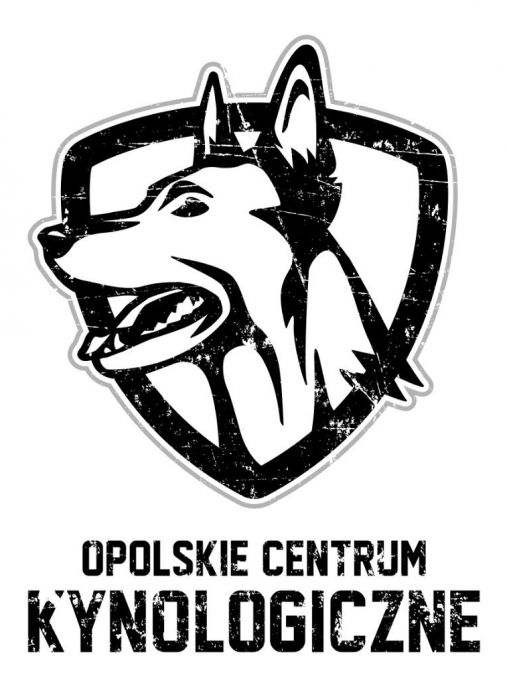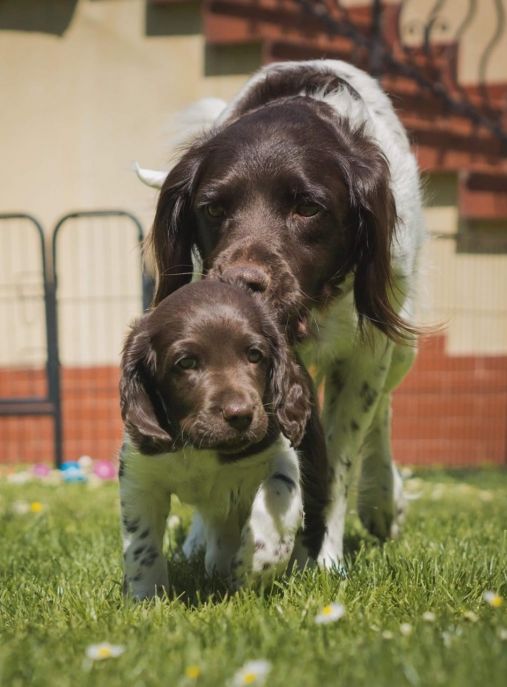The Kleiner Münsterländer, also known as the Small Münsterländer, is a versatile and intelligent dog breed that hails from Germany. This breed is highly regarded for its exceptional hunting skills, as well as its friendly and loyal nature. With a striking appearance and a strong work ethic, the Kleiner Münsterländer has become a popular choice for hunters and families alike.
The history of the Kleiner Münsterländer dates back several centuries. It is believed that this breed originated in the Münster region of Germany, hence its name. The breed was developed by crossing various spaniel and pointer breeds, resulting in a dog with exceptional scenting abilities and a keen sense of direction. Over time, the breed was refined and standardized, leading to the Kleiner Münsterländer we know today.
According to the FCI (Fédération Cynologique Internationale) typology, the Kleiner Münsterländer belongs to Group 7: Pointing Dogs. Within this group, it falls under Section 1: Continental Pointing Dogs, and is classified as a versatile hunting dog. This classification highlights the breed's ability to excel in various hunting tasks, including pointing, retrieving, and tracking.
The Kleiner Münsterländer is primarily bred for hunting purposes, making it an ideal companion for avid hunters. Its exceptional scenting abilities, combined with its natural instinct to point and retrieve, make it an invaluable asset in the field. Additionally, this breed's intelligence and trainability make it suitable for a variety of hunting environments, including upland game, waterfowl, and even tracking wounded game.
In addition to their hunting prowess, Kleiner Münsterländers also make wonderful family pets. They are known for their friendly and affectionate nature, and they thrive on human companionship. This breed is highly adaptable and can easily transition from the field to the home environment. They are excellent with children and other pets, making them a great choice for families looking for a versatile and loyal companion.
In terms of physical characteristics, the Kleiner Münsterländer is a medium-sized dog with a well-proportioned body. Males typically stand between 19 to 21 inches (48 to 54 cm) at the shoulder, while females are slightly smaller, ranging from 18 to 20 inches (45 to 51 cm). The breed has a muscular build, with a deep chest and strong legs that enable it to cover various terrains with ease.
The coat of the Kleiner Münsterländer is one of its most distinctive features. It is dense, medium-length, and slightly wavy, providing protection against harsh weather conditions. The breed's coat comes in a variety of colors, including brown, white, and roan, with or without ticking. This combination of colors gives the Kleiner Münsterländer a striking and elegant appearance.
In terms of weight, the Kleiner Münsterländer typically ranges between 40 to 55 pounds (18 to 25 kg). This weight range allows the breed to maintain its agility and endurance, which are essential for its hunting abilities. It is important to note that proper diet and exercise are crucial to maintaining a healthy weight for this breed.
The life expectancy of the Kleiner Münsterländer is around 12 to 14 years, which is relatively long for a medium-sized dog. This breed is generally healthy, but like all dogs, it can be prone to certain health issues. Some of the common health concerns for the Kleiner Münsterländer include hip dysplasia, ear infections, and eye problems. Regular veterinary check-ups and a balanced diet can help mitigate these risks.
In addition to their hunting and companionship qualities, the Kleiner Münsterländer possesses several interesting traits. They are known for their high energy levels and require regular exercise to keep them mentally and physically stimulated. This breed thrives on activities such as running, swimming, and retrieving, making it an excellent choice for active individuals or families.
The Kleiner Münsterländer is also highly intelligent and trainable. They excel in obedience training and can quickly learn and execute commands. This breed's eagerness to please their owners, combined with their natural hunting instincts, makes them a joy to train and work with.
In conclusion, the Kleiner Münsterländer is a versatile and intelligent dog breed that excels in hunting and makes a wonderful family companion. With their exceptional scenting abilities, friendly nature, and striking appearance, they have become a popular choice for hunters and families alike. Whether in the field or at home, the Kleiner Münsterländer is a loyal and devoted companion that brings joy and excitement to the lives of those fortunate enough to have them.
The Kleiner Münsterländer, also known as the Small Münsterländer, is a versatile and intelligent breed of dog that hails from Germany. These dogs are highly regarded for their exceptional hunting skills, but they also make wonderful family pets due to their friendly and affectionate nature. With their striking appearance and well-balanced character, Kleiner Münsterländers are a popular choice for dog enthusiasts worldwide.
In terms of their character, Kleiner Münsterländers are known for being highly trainable and eager to please. They are intelligent dogs that quickly grasp new commands and tasks, making them a joy to train. Their natural instincts as hunting dogs make them excellent at tracking, pointing, and retrieving, which can be further honed through proper training and socialization.
One of the defining traits of the Kleiner Münsterländer is their friendly and sociable nature. They are known to be great with children and get along well with other dogs, making them an ideal choice for families. These dogs thrive on human companionship and are happiest when they are included in family activities. They are loyal and devoted to their owners, forming strong bonds that last a lifetime.
When it comes to behavior, Kleiner Münsterländers are generally well-mannered and adaptable. They have a moderate energy level and require regular exercise to keep them mentally and physically stimulated. Daily walks, playtime, and opportunities to explore the outdoors are essential for their well-being. However, they are also content to relax and be calm indoors, making them suitable for both active and more laid-back lifestyles.
Proper socialization from an early age is crucial for Kleiner Münsterländers. Exposing them to various environments, people, and animals helps them develop into well-rounded dogs. Early socialization also helps prevent any potential shyness or fearfulness that may arise if they are not exposed to different stimuli during their formative months.
Training a Kleiner Münsterländer should be done with positive reinforcement techniques. These dogs respond well to praise, treats, and rewards, rather than harsh or punitive methods. Consistency, patience, and firmness are key when training them, as they can be independent thinkers at times. Early obedience training and basic commands are essential to establish a strong foundation for their behavior.
In terms of grooming, Kleiner Münsterländers have a medium-length, dense coat that requires regular brushing to prevent matting and keep it in good condition. They shed moderately throughout the year, with heavier shedding occurring during seasonal changes. Regular nail trims, dental care, and ear cleaning should also be part of their grooming routine.
In conclusion, Kleiner Münsterländers are intelligent, friendly, and versatile dogs that excel in various roles. Whether as a hunting companion, a family pet, or a working dog, they bring joy and loyalty to their owners. With proper training, socialization, and care, these dogs can thrive in any environment and make a wonderful addition to any family.
The Kleiner Münsterländer, also known as the Small Münsterländer, is a versatile and intelligent breed of dog that requires specific care to ensure their well-being and happiness. Here is an extensive description of the recommended care for Kleiner Münsterländer dogs, including tips on what to do and what not to do:
1. Exercise: Kleiner Münsterländers are active dogs that require regular exercise to maintain their physical and mental health. Aim for at least one hour of exercise daily, including walks, runs, and playtime. Engaging them in activities like retrieving, swimming, and agility training will keep them mentally stimulated.
2. Mental Stimulation: These dogs are highly intelligent and need mental stimulation to prevent boredom and destructive behavior. Provide them with puzzle toys, interactive games, and obedience training sessions to keep their minds engaged. They excel in activities like scent work and tracking.
3. Grooming: Kleiner Münsterländers have a medium-length, dense coat that requires regular grooming. Brush their coat at least once a week to prevent matting and remove loose hair. Pay extra attention during shedding seasons. Trim their nails regularly, clean their ears, and brush their teeth to maintain overall hygiene.
4. Socialization: Early socialization is crucial for Kleiner Münsterländers to develop into well-rounded dogs. Expose them to various people, animals, and environments from a young age. Enroll them in puppy classes to learn proper social skills and obedience training. This will help prevent fearfulness or aggression towards unfamiliar situations.
5. Diet: Provide a balanced and nutritious diet to support your Kleiner Münsterländer's overall health. Feed them high-quality dog food that meets their specific needs, considering their age, size, and activity level. Avoid overfeeding and monitor their weight to prevent obesity, which can lead to various health issues.
6. Health Care: Regular veterinary check-ups are essential to ensure your dog's health. Vaccinations, parasite prevention, and dental care should be part of their routine. Kleiner Münsterländers are prone to certain genetic health conditions, so discuss with your vet about any breed-specific concerns and conduct necessary health screenings.
7. Positive Reinforcement: These dogs respond well to positive reinforcement training methods. Use rewards, praise, and treats to motivate and encourage desired behaviors. Avoid harsh training techniques or punishment, as it can damage their trust and lead to behavioral problems.
8. Safety Measures: Ensure your Kleiner Münsterländer is safe and secure at all times. Provide a fenced yard or use a leash during walks to prevent them from running off. Keep toxic substances, small objects, and dangerous plants out of their reach. Provide a comfortable and safe sleeping area, away from drafts or extreme temperatures.
9. Family Time: Kleiner Münsterländers thrive on human companionship and are known to be excellent family dogs. Spend quality time with them, including cuddling, playing, and training sessions. Involve all family members in their care to strengthen the bond and prevent separation anxiety.
What not to do:
1. Do not leave your Kleiner Münsterländer alone for extended periods. They are social dogs and can become anxious or develop destructive behaviors if left alone for too long.
2. Avoid overexercising your dog, especially during their growth stages. Excessive exercise can lead to joint problems and injuries.
3. Do not use harsh training methods or physical punishment. This breed responds best to positive reinforcement and gentle guidance.
4. Avoid overfeeding or feeding your dog inappropriate food. Obesity can lead to various health issues and reduce their quality of life.
5. Do not neglect their grooming needs. Regular brushing and maintenance are essential to prevent matting and skin problems.
By following these tips and providing the recommended care, you can ensure that your Kleiner Münsterländer remains healthy, happy, and a cherished member of your family.
The Kleiner Münsterländer dog breed is known for its striking and distinctive coat color. These dogs typically have a rich and lustrous coat that is predominantly white with patches of liver or brown. The coloration of the Kleiner Münsterländer's coat is often described as a classic combination of white and liver, creating a beautiful and eye-catching appearance.
The white color in the coat of the Kleiner Münsterländer is usually the dominant color, covering the majority of the body. It is a clean and pure white, giving the dog a bright and elegant look. This white color serves as a canvas for the liver or brown patches that are scattered throughout the coat.
The liver or brown patches on the Kleiner Münsterländer's coat can vary in size and shape. They can appear as large solid patches or smaller speckles, creating a unique and individual pattern for each dog. These patches are typically well-defined and stand out against the white background, adding depth and character to the dog's appearance.
The liver or brown coloration in the Kleiner Münsterländer's coat is often described as a rich and warm shade. It can range from a deep chocolate brown to a lighter liver color, depending on the individual dog. This color adds a touch of warmth and earthiness to the overall look of the breed.
In addition to the white and liver/brown coloration, some Kleiner Münsterländer dogs may also have ticking or roaning. Ticking refers to small flecks or spots of color scattered throughout the white areas of the coat, while roaning refers to a mixture of white and colored hairs, creating a speckled or mottled effect. These additional markings further enhance the beauty and uniqueness of the breed's coat.
The color of the Kleiner Münsterländer's coat is not only aesthetically pleasing but also serves a practical purpose. The white color helps the dog stand out against the background when working in the field, making it easier for hunters to spot and follow their movements. The liver or brown patches provide camouflage in certain environments, allowing the dog to blend in with its surroundings during hunting or tracking activities.
Overall, the common color of Kleiner Münsterländer dogs is a stunning combination of white and liver or brown. This coloration, along with any ticking or roaning, adds to the breed's charm and elegance. Whether in the field or as a beloved family pet, the Kleiner Münsterländer's coat color is sure to turn heads and capture hearts.
The Kleiner Münsterländer, also known as the Small Münsterländer, is a versatile hunting dog breed originating from Germany. These dogs are known for their intelligence, agility, and strong hunting instincts. When it comes to their health, Kleiner Münsterländers are generally considered to be a robust and healthy breed. However, like all dogs, they are prone to certain health conditions that owners should be aware of.
One of the most common health issues seen in Kleiner Münsterländers is hip dysplasia. This is a genetic condition where the hip joint doesn't develop properly, leading to pain, lameness, and arthritis. Responsible breeders will screen their breeding dogs for hip dysplasia to reduce the risk of passing it on to offspring. Regular exercise, a balanced diet, and maintaining a healthy weight can help minimize the impact of hip dysplasia.
Another health concern in this breed is progressive retinal atrophy (PRA). PRA is a degenerative eye disease that leads to gradual vision loss and, in severe cases, blindness. Regular eye examinations by a veterinary ophthalmologist can help detect PRA early on. Unfortunately, there is no cure for PRA, but supportive care and environmental adaptations can help affected dogs lead fulfilling lives.
Kleiner Münsterländers are also prone to ear infections due to their long, floppy ears that can trap moisture and debris. Regular ear cleaning with a veterinarian-recommended solution and routine grooming can help prevent infections. Additionally, dental hygiene is crucial for this breed, as they are prone to dental issues such as gum disease and tooth decay. Regular brushing and professional dental cleanings can help maintain good oral health.
As active hunting dogs, Kleiner Münsterländers require regular exercise to keep them physically and mentally stimulated. Daily walks, runs, or play sessions are essential to prevent obesity and maintain muscle tone. Mental stimulation can be provided through puzzle toys, obedience training, and scent work. These dogs thrive in an environment where they have a job to do, so engaging them in activities such as tracking, retrieving, or agility can greatly contribute to their overall well-being.
Proper nutrition is vital for the health of Kleiner Münsterländers. A high-quality, balanced diet that meets their specific nutritional needs is essential. Consult with a veterinarian to determine the appropriate diet for your dog based on their age, activity level, and any specific health concerns.
Regular veterinary check-ups are crucial to monitor the overall health of Kleiner Münsterländers. Vaccinations, parasite prevention, and routine blood work are important aspects of preventive care. Early detection of any health issues can lead to more successful treatment outcomes.
In conclusion, while Kleiner Münsterländers are generally healthy dogs, they are prone to certain conditions such as hip dysplasia, PRA, ear infections, and dental issues. Responsible breeding practices, regular veterinary care, proper nutrition, exercise, and mental stimulation are key to maintaining the health and well-being of these wonderful hunting companions.
The Kleiner Münsterländer, also known as the Small Münsterländer, is a versatile hunting dog breed originating from Germany. As an active and energetic breed, it is essential to provide them with a well-balanced and nutritious diet to support their overall health and performance. Here is an extensive description of the nutrition requirements for Kleiner Münsterländer dogs, along with advice on feeding and things to avoid.
Protein is a crucial component of a Kleiner Münsterländer's diet, as it helps in muscle development and repair. High-quality animal-based proteins such as chicken, turkey, beef, and fish should be the primary source of protein in their diet. It is recommended to feed them a diet that contains at least 18-22% protein, depending on their age and activity level.
Fats are another essential nutrient for Kleiner Münsterländer dogs as they provide energy and support healthy skin and coat. Opt for healthy fats like fish oil, flaxseed oil, and chicken fat. These fats also contain omega-3 and omega-6 fatty acids, which have anti-inflammatory properties and promote a shiny coat. However, it is important to monitor the fat intake to prevent obesity, especially for less active or older dogs.
Carbohydrates are a source of energy for dogs, but it is crucial to choose complex carbohydrates that provide sustained energy release. Whole grains like brown rice, oats, and quinoa are excellent options. Avoid feeding your Kleiner Münsterländer foods with excessive amounts of simple carbohydrates, such as corn or wheat, as they can lead to weight gain and potential allergies.
Fruits and vegetables are beneficial for providing essential vitamins, minerals, and antioxidants. Incorporate a variety of these into your dog's diet, including carrots, sweet potatoes, blueberries, and spinach. However, be cautious with certain fruits like grapes, raisins, and avocados, as they can be toxic to dogs.
Feeding guidelines for Kleiner Münsterländer dogs can vary depending on their age, weight, and activity level. Puppies require more frequent meals, typically three to four times a day, while adult dogs can be fed twice a day. It is important to measure the food portions according to their specific needs to prevent overfeeding and obesity.
Avoid free-feeding or leaving food out all day, as it can lead to overeating and weight gain. Instead, establish a regular feeding schedule and remove any uneaten food after 15-20 minutes. This helps maintain a healthy weight and prevents picky eating habits.
Treats can be a part of your Kleiner Münsterländer's diet, but they should be given in moderation. Opt for healthy, natural treats that are low in calories and avoid those with excessive additives, preservatives, or artificial ingredients. Treats should not exceed 10% of their daily caloric intake.
Lastly, always provide fresh and clean water for your Kleiner Münsterländer. Hydration is essential for their overall health and well-being.
In conclusion, a well-balanced diet is crucial for the nutrition of Kleiner Münsterländer dogs. Focus on high-quality proteins, healthy fats, complex carbohydrates, and a variety of fruits and vegetables. Avoid excessive fat intake, simple carbohydrates, and toxic foods. Establish a regular feeding schedule, measure portions, and provide treats in moderation. By following these guidelines, you can ensure your Kleiner Münsterländer remains healthy, active, and happy.

